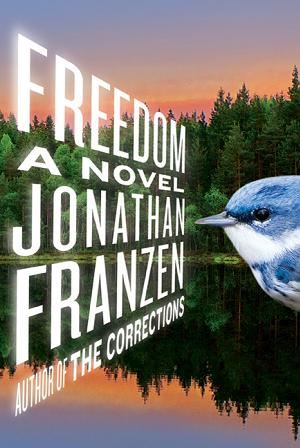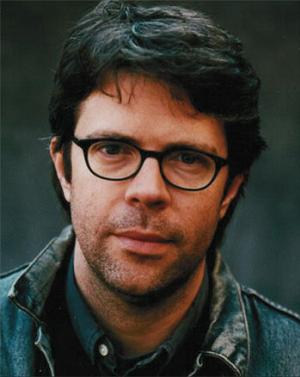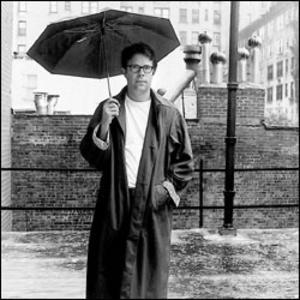Book Review: Freedom by Jonathan Franzen
 | | Freedom by Jonathan Franzen |
It has been nearly a decade since Jonathan Franzen released The Corrections, which won numerous awards and came a hair's breadth from winning Franzen a Pulitzer. Now, finally, his long-gestating Freedom is in store shelves, and critics have already hailed it as one of the most important novels ever written. It's gotten so much attention in critical, academic, and artistic circles that even the president has been seen holding a copy. Franzen's Freedom will inevitably be used as a measuring stick for other works of contemporary literary fiction, but despite this, the book has proven surprisingly polarizing. Is this work the magnum opus that will win Franzen his Pulitzer--a masterpiece that should be added to required reading lists across the country right alongside the undeniable classics--or is it just an overrated, evanescent flash in the pan that captures the hearts of critics but fails to connect with the rest of us?
The problems begin with the characters. Whether it's the gossipy neighbors who open the novel, the self-flagellating Patty who spends hundreds of pages doing nothing but making mistakes and feeling sorry for herself, her intensely cynical and angry husband Walter, or the vapid rock star and womanizer she lusts after, the characters are all insipid, judgmental, and unlikeable. While there is nothing inherently wrong with a novel having unlikeable characters (indeed, some of the greatest literary characters of all time are deeply unlikeable), these characters are so disagreeable and caustic that it is hard for the audience to ever connect to them, much less show interest in page after page of their exhaustive family histories, their navel-gazing self-loathing, their overly-detailed sexual lives, and their oftentimes bitter and unsympathetic politics. Since this accounts for the majority of the story, it is no wonder that some people are unable to enjoy reading it.
Still, despite being abyssmally disagreeable, these people are extremely genuine, vivid, and realistic. They are lovingly crafted messes, full of dimension, psychological nuance, and detail. Franzen has taken exquisite care to make his characters feel like living, breathing human beings, even though he didn't take as much care in making them worthy of your time.
 | | Jonathan Franzen |
The plot follows the unhappy lives of the Berglunds, a modern, middle-class nuclear family that seems unable to relax, communicate effectively, or deal with their problems. Nothing overly dramatic happens to them, but there is no dearth of soap-operaish melodrama. For this reason, Freedom is often compared to much older novels of the Eighteenth and Nineteenth Centuries. Indeed, the book often refers to Tolstoy's War and Peace--unnecessarily rammering the allusion down the audience's throat multiple times--but it could also be compared to the works of the Brontë sisters, Jane Austen, or even the Twentieth Century's Ayn Rand (especially The Fountainhead, though I'm sure Franzen would recoil at the association). This is certainly not a complaint, though readers more fond of genre fiction will find their patience tested by the long-winded digressions Franzen is prone to or the ludicrously long chapters that can go for fifty pages without a single break.
Thankfully, Franzen's style is immensely readable. He occasionally gets bogged down by cheap literary tricks--like unnecessarily capitalizations, sentence fragments, and ornate, run-on sentences--but for the most part, his words flow effortlessly, sometimes even hypnotically. He rarely gets carried away by his own language, but he is also careful to not sound clinical or dry. As a wordsmith, Franzen is tough to match.
However, his tone often comes across as crotchety and mean-spirited. There are times when characters--most notably Walter, the activist husband who spends most of the novel trying to save the world from other humans--begin monologuing about the evils of modernization, the horror of housecats roaming outdoors, the injustice of an ever-growing population sprawling across the countryside, or the abuses of that most horrific of all demonic forces in the entire universe: Republicans. During these monologues, regardless of the character giving them, it is hard to separate the character from the narrator, especially when these rants go on a bit too long, are a bit too repetitive, and all sound pretty much the same even though the characters otherwise are distinguishable from one another. It is during these incredibly cynical and hate-fueled speeches, which so transparently come from Franzen himself, that the book is at its worst.
 | | Jonathan Franzen |
He attempts to tie everything together with a nebulous notion of how freedom affects people, but you quickly get the sense that Franzen's definition of the word is far different than the definition most people would give. Whenever the word pops up in the narrative, it usually comes with all manner of negative connotations, as though freedom itself were actually to blame for all the mistakes the characters make, all the depression they suffer from, and all the unacceptable aspects of the political, social, and corporate world. Even when one character is rebellious enough to embrace conservative ideals, he does so only with the most cynical, stereotypical, and coarse understanding of conservatism (and he quickly does an about face when he discovers that capitalism under the fiendish Bush administration is, of course, evil). This is disappointing, since Franzen illustrates many different forms and shades of liberal ideologies. It is clear that Franzen, even when given the opportunity, refuses to critically examine ideas he has prejudged for decades.
Perhaps the most distasteful example of this is when he brings up 9/11. It only comes up in the context of a single character, Joey (the Berglund's son), who sees it as an irritating distraction and feels that the way people react to it is stupid. The audience learns this when it meets Joey for the first time. This is hardly a good way to endear a new character to the reader, especially when Franzen then goes on to describe, in intimate detail, Joey's masturbatory habits. Joey's story continues to be unapologetically distasteful (even scatological at one point), and when the novel finally ends, his character's entire story arc seems like a pointless digression that only rubbed up against the main plot once or twice. The long chapters from his point of view could be cut out of the book entirely, without losing anything critical, and the remainder would probably be a better story.
Thankfully, the ending of the novel makes up for a large quantity of its flaws. Without spoiling anything, I will say that the conclusion is well-deserved and beautiful, easily the best part of the entire book. It is so good, in fact, that it almost doesn't seem to fit. Still, with a story as cynical and depressing as the first ninety-five percent of Freedom is, it is refreshing to have it end on an uplifting note.
[Once again, special thanks to Salon.com, Open Salon, Laura Miller, and the Salon Book Club, without which this review would not be possible. Hopefully, this less-than-gushing review won't preclude me from more reviews in the future.]
FINAL SCORE:





Despite extremely well-drawn characters, a beautiful ending, and excellent writing, Freedom--with its unpleasant characters and muddled, cynical themes--manages to be neither entertaining nor enlightening.
|
-e. magill 9/14/2010
|
|